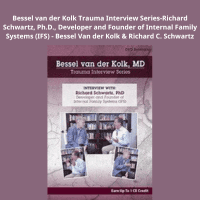Course Summary:
This interview series brings together two leading figures in the field of trauma and psychotherapy: Bessel van der Kolk, renowned for his groundbreaking work on trauma, and Richard Schwartz, the creator of the Internal Family Systems (IFS) model. Through in-depth conversations, they explore the profound impact of trauma on the psyche and how the IFS framework offers a powerful and compassionate approach to healing. The series delves into how trauma affects the internal “parts” of a person, as understood by IFS, and how this model can be effectively integrated into trauma-informed therapy. Viewers will gain a deeper understanding of the neurobiological effects of trauma as discussed by van der Kolk, and how IFS provides a pathway to accessing inner resources and fostering self-healing.
Target Audience:
This program is ideal for:
- Therapists, counselors, and psychotherapists seeking to enhance their understanding and treatment of trauma.
- Mental health professionals interested in learning about the Internal Family Systems (IFS) model and its application to trauma.
- Individuals who have experienced trauma and are interested in learning more about healing and self-compassion through IFS.
- Psychology students and researchers interested in trauma studies and innovative therapeutic approaches.
- Anyone seeking a deeper understanding of the interplay between trauma and the internal psychological system.
Main Content:
The interview series likely covers key areas such as:
- Understanding Trauma from a Neurobiological Perspective: Bessel van der Kolk’s insights into how trauma affects the brain and body.
- Introduction to the Internal Family Systems (IFS) Model: Richard Schwartz explaining the core concepts of parts, self, and the IFS approach.
- The Impact of Trauma on Internal Parts: How traumatic experiences can lead to the development of specific “protector” and “exile” parts within the IFS framework.
- IFS Techniques for Working with Trauma: Practical applications of IFS principles for accessing and healing traumatized parts.
- Fostering Self-Compassion and Inner Healing: How IFS facilitates the individual’s own capacity for healing and integration.
- Integrating IFS with Trauma-Informed Care: Exploring how the IFS model aligns with and enhances trauma-informed therapeutic practices.
- Case Examples and Clinical Applications: Potential discussions of how IFS can be applied in real-world trauma therapy scenarios.
- The Role of the “Self” in Trauma Healing: Emphasizing the core of wisdom, compassion, and resilience within each individual, as understood by IFS.
Without a specific sale page link, this summary is based on the likely content given the expertise of Bessel van der Kolk and Richard Schwartz and the focus on trauma and IFS. If you can provide the sale page, I can refine the summary further.
Explore the intersection of trauma and IFS with leading experts!
SIGN UP NOW








